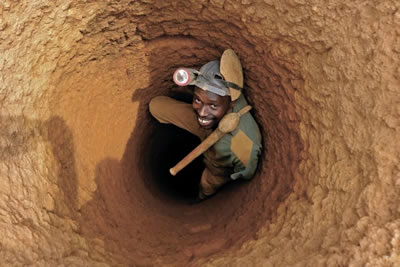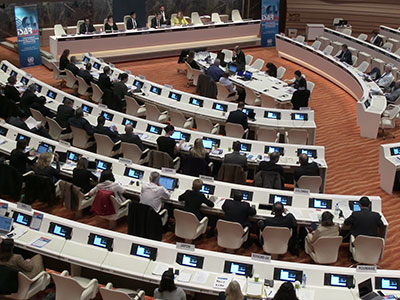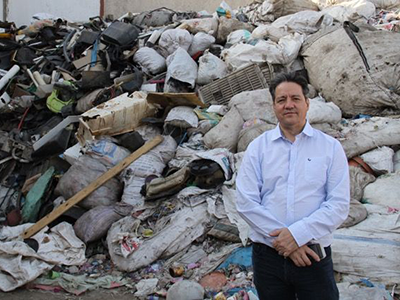The year 2017 was a busy one for UNCTAD as the implementation of the previous year’s Nairobi Maafikiano picked up pace. Here is a glimpse of just some of the things UNCTAD got up to during the fourth quarter of 2017.
OCTOBER
On 2 October, UNCTAD launched its far-sighted Information Economy Report, surveying how digitalization is impacting every aspect of production and trade, from the largest corporations to the smallest traders – and warning of the risk of widening income inequalities.
The third annual UNCTAD Business-to-Consumer E-Commerce Index, released on 4 October, named Luxembourg, Switzerland and Norway as the world’s most advanced nations for online shopping, but also contained vital data on progress made in developing countries.
A new Intergovernmental Group of Experts on E-Commerce and the Digital Economy, convened by UNCTAD, met for the first time on 4–6 October. During the meeting, Samoa received its UNCTAD-authored Rapid eTrade Readiness Assessment.
On 6 October, UNCTAD Deputy Secretary-General Isabelle Durant said the growing concentration of market power in the hands of big international companies was a worrying trend for small businesses, at the launch of an International Trade Centre report.

Speaking at the multi-year expert meeting on investment, innovation and entrepreneurship for productive capacity-building and sustainable development on 9–11 October, UNCTAD Secretary-General Mukhisa Kituyi said that a changing investment policy landscape has investors feeling uncertain when the world's most vulnerable economies need foreign cash.
At the multi-year expert meeting on commodities and development on 12–13 October, Ms. Durant said that green energy could help developing countries that are too dependent on commodities exports diversify their economies and reduce their vulnerabilities to volatile markets.
Her intervention was accompanied by the publication on 13 October of UNCTAD’s State of Commodity Dependence report, which revealed that nine more developing economies became dependent on commodity exports between 2010 and 2015.

The Intergovernmental Forum on Mining, Minerals, Metals and Sustainable Development met on 16–20 October, with a focus on the social and environmental issues facing small-scale and artisanal miners.
Meanwhile, with medical experts warning of a "post-antibiotic apocalypse", UNCTAD legal officer Christoph Spennemann explained on 20 October why joint public-private investment is the missing weapon in the war against the spread of antibiotic resistance.
UNCTAD’s widely respected Review of Maritime Transport, the leading global survey of shipping data and analysis, launched on 25 October, showed that while demand for maritime shipping picked up in 2016, it lagged the historical 3% average.
Senegal announced on 27 October that the country will work with UNCTAD to boost the competitiveness of its cashew and mango exports, while UNCTAD's Science, Technology and Innovation Policy Review of Rwanda was presented to the Rwandan government on 28 October.
NOVEMBER
The way companies measure the revenues they generate, what they spend on research, who sits on their boards and even the amount of waste products they recycle was discussed at the Intergovernmental Working Group of Experts on International Standards of Accounting and Reporting, facilitated by UNCTAD, on 1–3 November.
A joint UNCTAD-OECD report, published on 9 November, indicated that investment policy measures taken by G20 Members were mostly geared to greater openness for foreign investment. At the same time, an increase in policies related to national security was recorded.
Tax avoidance like that revealed by the Paradise Papers is a threat to the economic and social aspirations of the international community since tax not paid denies an important stream of financing, experts said at the Intergovernmental Group of Experts on Financing for Development, meeting for the first time on 8–10 November.

Investment between firms in the 10 member States of the Association of Southeast Asian Nations (ASEAN) rose to a record $24 billion in 2016 thanks to increased financial strength and cash holdings, as well as a growing drive to internationalize their operations, according to the annual UNCTAD-ASEAN investment report for the region launched on 15 November.
Also on 15 November, a Tanzanian start-up making reusable sanitary pads from biodegradable cotton won first prize at a youth entrepreneurship pitching event, taking home $15,000 in equity. Winner Jennifer Shigoli, a graduate of UNCTAD's entrepreneurship training program Empretec, created Elea Pads after she saw that young girls were frequently absent from school during menstruation because they couldn't afford disposable sanitary pads.

A conference session at the 6–17 November COP23 climate conference in Bonn, Germany, organized by UNCTAD, UNDP and the Islamic Development Bank, heard that reining in greenhouse gas emissions in the transport sector is vital, but the strong focus on passenger traffic should not mask the need to make freight more sustainable. The climate conference also heard that efforts to curb carbon emissions will have sweeping impacts on trade, but commerce was part of the solution, not the problem.
Other UNCTAD events in Bonn included a session on the circular economy and green finance.
The Gambia, aiming to boost foreign direct investment and develop entrepreneurship to create jobs, received UNCTAD’s Investment Policy Review (IPR) on 21 November.
Combined with its National Entrepreneurship Policy, the Gambia, among other things, aims to stem outward migration. On the same day, UNCTAD’s first regional investment policy review, looking at the economies of South-East Europe (SEE) and initiated at the request of the Regional Cooperation Council (RCC), was received by RCC Secretary General Goran Svilanović. The IPR aims to assist the beneficiary economies achieve the development objectives set in the SEE Strategy 2020 and the Sustainable Development Goals.

Agencies from Ethiopia, Mauritius and Spain, received the 2017 United Nations Awards for Promoting Investment in the Sustainable Development Goals at UNCTAD’s Investment, Enterprise and Development Commission, held from 20–24 November. Successful entrepreneurs from around the globe told the commission that for-profit businesses could be key partners in solving economic, social and environmental problems.
On 22 November, UNCTAD launched its illuminating annual Least Developed Countries Report, spotlighting the importance of access to adequate, reliable and affordable sources of modern energy.
Alibaba Business School and UNCTAD brought together 24 Africa-based entrepreneurs to participate in the inaugural eFounders Initiative, concluding on 23 November.
UNCTAD’s project to assess the e-trade readiness in the Least Developed Countries received nearly $900,000 in funding from Germany on 29 November.
DECEMBER
UNCTAD launched its annual Handbook of Statistics on 5 December in a new, user-friendly format to celebrate its fiftieth year of publication. The 2017 edition was overhauled entirely to make it shorter and easier to read, and features a wealth of maps, charts, and infographics.
Two dozen Beninese women making a unique type of garri flour signed up to a new code of practice to better market their product and boost incomes, as part of UNCTAD’s work on Geographical Indications for Least Developed Countries.
Without policy change, commodity-dependent developing countries risked falling short of achieving sustainable development by 2030, the Commodities and Development Report 2017 published by UNCTAD and the Food and Agriculture Organization of the United Nations on 11 December warned.
At the World Trade Organization’s Eleventh Ministerial Conference (MC11) in Buenos Aires, Argentina, on 10–13 December, UNCTAD held a series of events on overfishing, non-tariff measures, trade facilitation, market access for Least Developed Countries, multilateralism, e-commerce, convergence of rules of origin, and more. Although the biennial meeting failed to come to any binding agreements, UNCTAD was involved in a declaration on women’s empowerment that united 70% of members, and UNCTAD’s eTrade Readiness Assessment of Nepal was aired.
Meanwhile in December, cotton farmers and government officials in Zambia agreed to promote the production of cotton by-products like sanitary pads and biomass fuels, to create jobs and diversify the copper-dependent economy. The agreement was part of UNCTAD’s work on cotton by-products in Eastern and Southern Africa.

During the Internet Governance Forum on 18–21 December, participants said that UNCTAD would be a relevant organization to provide much-needed face-to-face encounters between the trade and Internet communities, for example, through its E-Commerce Week, and its new Intergovernmental Group of Experts on E-Commerce and the Digital Economy.


